|
Buddhist Spectrum
Mahabodhi Centre’s contribution to Buddhism
Jeewani PATHIRANA
Buddhists consider setting foot on the native land of the Buddha a
fortune. Blessed are those who are born in this sacred land.
My motive is to recollect memories of Buddhagaya, worshiped by
thousands of pilgrims annually from Sri Lanka and world over. Buddhagaya
is the most esteemed sacred place of worship for Buddhist devotees world
over. Devotees start and conclude their journey to Buddhagaya from
Mahabodhi centre at Egmore in Chennai.
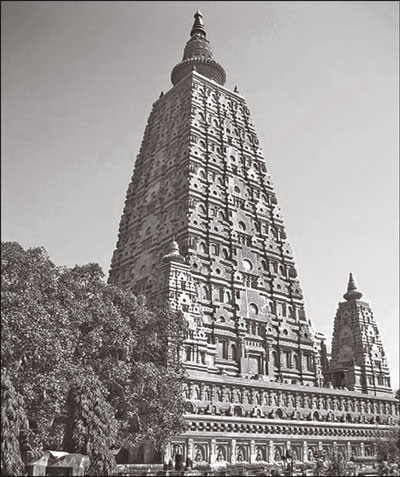 |
|
Bodh Gaya |
This has become the most sought after pilgrims' rest of more than 95
percent of the pilgrims to Buddhagaya. Yeomen services are rendered to
the devotees at this 'ancestral home' without much harping.
Mahabodhi centre – Chennai is both a blessed sacred site and a
shelter of a safe heaven for pilgrims of all walks of life. It provides
both shelter and security to pilgrims.
The establishment of the Maha Bodhi Society Sri Lanka at Maligawatte,
Maradana in 1891 by Anagarika Dharmapala on his return to the island
with the assistance of Most Venerable Hikkaduwe Sri Sumangala Thera is a
landmark event in the history of Sri Lanka. A branch of the Maha Bodhi
Society – Sri Lanka was set up in Madras (Chennai) as well.
The main objective of setting up this branch in Chennai was to
provide shelter, assistance and guidance to the devotees who visit
Buddhagaya annually. From its inception the Maha Bodhi centre – Chennai
has rendered noble services to all visitors without any discrimination.
During the days gone by the devotees used to arrive in Chennai by
travelling in train from Rameshwaram to Egmore, via Fort, Mannar. It was
an ardous trip those days. Since there were no pilgrims rests or any
other suitable place to stay then, the pilgrims had to sleep at the
stations, at the backyard of boutiques and street corners. The pilgrims
to Buddhagaya had to face untold hardships in the past.
Anagarika Dharmapala pioneered the setting up of the Mahabodhi centre
– Chennai, with the money he borrowed from Sir Kent, in favour of the
Maha Bodhi society – Sri Lanka, to provide redress to those who had to
undergo severe hardships during their journey to the holy city.
Today the Mahabodhi centre – Chennai stands majestically with two
luxurious buildings. This centre is maintained with the lavish donations
made by the generous devotees who visit Buddhagaya. The prominent among
them are Sri Lankan Buddhists. This is the most significant place in
India, which Sri Lankans claim as their own.
Multiple services are provided by the Mahabodhi centre – Chennai at
present. The provision of facilities and guidance to pilgrims are the
most prominent among them. The centre also lends a helping hand to those
who fall ill, get stranded and whenever pilgrims die while on tour.
Furthermore, the centre assists the needy to obtain passports, visas
etc and those who become victims of under world activists, by providing
guidance and other relevant services.
Mahabodhi centre also assists the fishermen who are stranded and Sri
Lankan fishermen who are released from Indian custody, and those who get
caught to human smugglers/bogus agents promising lucrative employment in
countries such as Italy. The centre provides an amazing wide range of
services. To Sri Lankans this centre become a second home.
It is appropriate to call this centre, the “Unoffiical Sri Lankan
Embassy” in India.
A massive building is now under construction at the Mahabodhi centre
under the guidance of the President of the Mahabodhi Society – Sri Lanka
and Chief Sangha Nayake of Japan Ven Banagala Uppatissa Thera and the
Chief Incumbent of the Mahabodhi centre Chennai and Nalandaramadipathi –
Nugegoda Ven Thiniyawela Thera to provide additional accommodation to
centre to the needs of the pilgrims. The commitment and the yeomen
services rendered by the Chief prelate in-charge of the Mahabodhi centre
Ven Kalawane Mahanama in making this noble venture a success is
praiseworthy.
One of the sprawling Pilgrims Rests in this Mega Building has been
reserved for Sri Lankan Buddhist pilgrims and Sri Lankans. Ven Mahanama
Thera who is devoted to serve the needy round the clock said, “we have
scarcely any time to eat, sleep or even bathe. We are always at the
service of those who visit us during the 365 days of the year. There are
instances where we have not had a wink of sleep.”
“During the height of LTTE insurgency we had to undergo a lot of
hardships. Not only the Mahabodhi centre, we as priests residing in this
centre too had to share direct or indirect impacts of any issues which
arose between Sri Lanka and India.”
Since our services are not confined to Sri Lankans, the Indian Tamil
Hindu people always stand by us whenever we are faced with such
troubles.
We have also launched several programmes to promote Buddhism. Vesak
festival, Vesak processions, sermons, meditation programmes, Dhamma
discussions, conducting medical clinics, ordaining of priests,
construction of temples, Katina pinkamas, commemoration of birth
anniversary of Anagarika Dharmapala are some such significant
activities.
Hence, Mahabodhi centre – Chennai could be classified as both a
religious as well as a social services centre.
A sponsor of pilgrims to Dambadiva commented, “There are several
brokers who try to hoodwink pilgrims by reefing them to various so
called hotels, which are extremely dirty. In certain places the pilgrims
are threatened, abused and insulted.”
There is much competition among travel agents. They try to put you up
in any place, functioning under the guise of hotels. The hospitality,
assistance and the guidance provided at Mahabodhi centre and the
security it provides is far above. One cannot expect this kind of
hospitality any where else.”
“Several instances have been reported to the Mahabodhi centre,
Chennai where, Sri Lankans have been illtreated and abused, some have
been spitted even on their face,” said Ven Mahanama Thera.
I feel it is far better to sleep on a mat in peace in a place of our
own such as the Mahabodhi centre whenever we go on pilgrimage to
Buddhagaya rather than putting up in shoddy hotels.
The silent services rendered by President of the Mahabodhi society –
Sri Lanka, Ven Banagala Uppatissa, the chief Incumbent of the Mahabodhi
centre – Chennai Thiniyawela Palitha and Ven Kalawane Mahanama Thera
instrumental for the reawakening of the Mahabodhi centre – Chennai is
indeed praiseworthy.
The new building in the premises has been constructed with a loan
obtained from the Bank of Ceylon and the lavish donations given by the
devotees and well wishers.
Even the poor elders from Sri Lanka who visit Dambadiva contribute
their might for the up keeping, administration and maintenance of this
centre.
Ven Mahanama Thera says that he is guided by the Head priest Ven
Thiniyaye Palitha Thera in discharging these noble services for a period
of more than 11 years.
The hand of Ven Mahanama Thera is strengthened by the support given
by the assistants Ven Nagoda Samitha Thera and Wattegama Chandimaputta
Thera.
It was revealed that approximately 150,000 devotees visit the
Mahabodhi centre – Chennai annually.
Some of them get caught to those who indulge in nefarious activities.
As such safeguarding them has been upper most in the minds of the
inmates of this centre.
So, the pilgrims, who proceed to Buddhagaya should make it a point to
avoid seeking accommodation in notorious hotels, when settles is
available under the fully equipped safe heaven of the Mahabodhi centre –
Chennai.
Concentrated mind, path to bliss
Dr Padmaka SILVA
Pathama Papanika Sutta has already been discussed. In that Sutta the
Buddha states further “Oh monks, the businessman with three
characteristics qualifies to receive wealth hitherto not received and to
enhance the wealth already received. What are those three
characteristics?
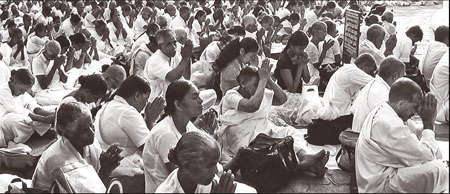 |
|
Meditation
is for daily purpose |
“The businessman systematically engages in his business in the
morning. He engages in the business activities systematically in the
midday also. He carries out his business activities systematically in
the evening also. Oh monks. The businessman with these three
characteristics becomes qualified to receive wealth hitherto not
received and to enhance the wealth already with him.”
The Buddha further states: “In the same manner, O Bihikkhus, the
Bhikkhu with three characteristics qualifies to achieve merit not
already received and to improve further the merit already possessed by
him.
What are those three characteristics? The Bhikkhu engages
systematically in his Samadhi objective in the morning. He
systematically engages in his Samadhi objective in the midday also. He
does so in the evening also. The Bhikkhu with these characteristics
qualifies to receive merit already not received and to enhance merit
already acquired by him”.
To acquire good results from this Dhamma to get a big benefit we must
use our life to engage systematically in the Dhamma. Otherwise we use
our life for useless activities. Even if we do something we do not get
the solace we expected.
Why do we engage in this Dhamma? To get solace. If we do not get the
expected solace even after engaging in the Dhamma for a long time it
means what we have done have not been done systematically. That is why
we do not get the expected solace. Therefore you also practice to engage
in the Dhamma systematically in the morning, midday and evening. Then
you will have a control on your life. After sometime you will come to a
state of self – control.
Then you will have something to do. Therefore you will have to wake
up early in the morning. Why? Because you have something to be done. If
there is nothing to be done one does not feel like getting up early. One
is lazy. If there is nothing to be done in the daytime one will remain
in idle talk. If there is nothing to be done in the evening he will
spend the evening also in idle talk. Ultimately there will be nothing.
Therefore if we have something to be done we may commit our entire life
for it. Therefore the mind does not get directed to unnecessary things
that cause the deterioration of the mind.
Therefore we must get used to make use of the time throughout the day
morning, daytime and evening.
If we do not get used to these things now itself we cannot do it
later. Why cannot we do it later? If we get into an inappropriate
pattern it is difficult to change it.
Therefore we must adapt our life systematically to an appropriate
style now itself. Therefore if we are practicing a meditation do it in
the morning. Try to do it in the daytime. Do it in the evening also.
Get used to doing in that manner from the beginning itself. Then
there is the possibility of getting successful results from it.
Sometimes we may feel that it is impossible for us to do so.
Then what should we do? Most people may feel “Can’t do it now. I
shall do it later”.
Our mind gets inclined that way. But that is not how we should set
about it. At that time we must make some effort. Then our mind moves
forward to a certain extent.
It is something like this. Suppose one is going on a difficult
journey.
It is a very difficult journey. On some occasions he has to go
downhill. Then he goes fast.
Sometimes he travels on level road. In that manner he may come across
downhill stretches and level stretches. Sometimes he may come across
hilly stretches. On level stretches he travels quite comfortably.
He can travel while observing the scenery on either side. When he
finds a descending stretch can he travel leisurely as earlier? Can he
travel while looking at either side of the road? Can’t. Why? Because
there is a danger.
At such a place he has to travel carefully. Simply because it is
downhill he cannot travel carelessly. After that he may come across the
uphill stretch. Can he travel in the way he travelled on the level
stretch? If he sits down saying now the climb is too much. It is
impossible. What will happen? The journey ends there.
That is why we say that the mind is different in the morning, noon
and evening.
Therefore if we are training our mind for a Samadhi it should be
practiced in the morning, noon and evening. If not it will become
impossible to make it strong. By meditating we are trying to develop the
mind. If one meditates in the daytime and not in the morning it becomes
impossible to acquire merit which have not been acquired so far.
Whatever merit has been acquired deteriorates. It becomes impossible
to develop them.
Therefore even for a short while we must meditate in the morning, day
time and evening. Very often some people are lazy in the morning.
They think it is difficult at that time. But we must try.
When going on a journey if we have to climb a hilly stretch we
proceed slowly using walking sticks and sweating.
That way he is able to cover the hilly stretch. But it is tiresome.
Extremely difficult.
For some people the meditation does not develop in the night. Do not
abandon it saying that it does not develop. Make an attempt. Do even a
little at such times.
When one says it does not develop it is because the concentration
does not take place. For some people concentration develops in the
daytime.
It does not develop in the morning. For some people it does not
develop at night. Do not give up saying it does not develop. At such
times practice systematically even for a short time and then it will be
possible to come to a stage when the Samadhi objective can be maintained
at any time.
What happens if a driver drives his vehicle always on the straight
road? It becomes impossible to drive on a road with bends.
He can never become a good driver. If one learns to drive only in the
daytime it becomes impossible for him to drive in the night. If he
practices to drive at all times he becomes a clever and skilful driver.
Meditation is also like that. Do it in the morning. Do it in the
daytime. Do it at night also.
Do even for a short while the meditation you are practicing.
You can gather successful results only if you do it that way. If not
it becomes impossible to develop that meditation. If there is a
meditation that has developed it becomes difficult to improve it.
(With instructions by Ven Nawalapitiye Ariyawansa Thera)
[email protected]
Remembering Ambedhkar
Senaka WEERARATNA
As a leading Buddhist country in the world, the Buddhists of this
country should seriously consider requesting the Government of Sri Lanka
to issue a commemorative postage stamp in honour of Dr B R Ambedkar, for
the great work he has done for his people and the cause of Buddhism in
India.
There are nearly 250 Million Dalits in India which is virtually 1/4th
of the Indian Population.
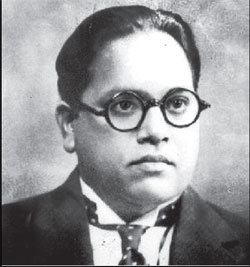 |
|
Dr B R
Ambedkar |
Sri Lanka should befriend these people.
Buddhism can cement ties between Indian Dalits and Sri Lanka.
Mayawati, the Chief Minister of Uttar Pradesh, is a staunch Buddhist.
She heads the Bahujan Samaj Party, which represents the Bahujans or
Dalits, the weakest strata of Indian society.
This is her fourth term as Chief Minister of Uttar Pradesh. She is an
icon for millions of India's Dalits. She is sometimes referred to as
Behen-ji (sister).
With a population of over 200 million people, Uttar Pradesh is
India's most populous state, as well as the world's most populous sub -
national entity. Uttar Pradesh (UP) is the second largest state-economy
in India, with a GDP of $103.5 billion in 2009.
The annual per capita GDP of the state was $1586 in 2009. It
contributed 8.34% to India's total GDP in the financial year 2010.
UP also has several sites important to Buddhism: the Chaukhandi Stupa
marks the spot where Buddha met his first disciples, while the Dhamek
Stupa in Sarnath commemorates Buddha's first sermon. Further, the town
of Kushinagar is where the Buddha attained Maha Parinirvana.
Sri Lanka should invite Mayawati to visit Sri Lanka and in turn seek
the strengthening of economic and religio -cultural ties between Uttar
Pradesh and Sri Lanka, The Buddhist World must give her recognition
outside India.
The example of Ambedkar embracing Buddhism should be given the widest
publicity in the North and East to motivate the so called low caste
Tamils in these areas and the Hill Country of Sri Lanka to pursue a
similar path.
Buddhism teaches equality. This was Dr Ambedkar's message to his
fellow Dalits. Indian Dalits who are Buddhists (in the absence of Dr.
Ambedkar) may well spread that message among Tamils in Sri Lanka who
feel persecuted and oppressed by members of the higher profile Tamil
castes.
Dr Ambedkar's inspiring legacy may well play a bigger role in Sri
Lanka's efforts at reconciliation between various communities.
Kalutara Bodhi Trust prize-giving
Divakara MOHOTTI- Kalutara Gr. Corr.
Buddhism, Hinduism, Islam and Christianity are the four main
religions in the world. Sri Lanka also accommodates the followers of
these religions.
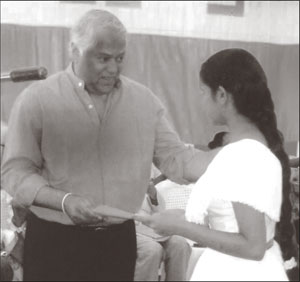 |
|
Ajantha de
Zoysa hands over a certificate to a student who
obtained the highest marks in English language. |
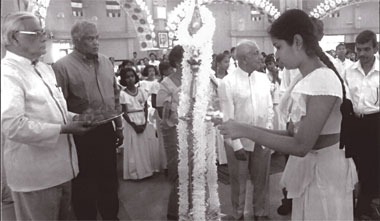 |
|
Prof J B
Dissanayaka is getting ready to offer flowers |
The well-known scientist Arthur C. Clarke who lived in Sri Lanka had
forecasted that Buddhism is the only religion that would survive by
2050. This was revealed by Professor J B Dissanayaka.
He was addressing a group of Dhamma School students of Kalutara
district at the ceremony organized by Kalutara Bodhi Trust. The prizes
and certificates were given to those who have achieved higher marks in
English language.
Speaking further Professor Dissanayaka said that in Sinhala we have
two groups of Buddhists. However both these groups further studies in
Buddhism to improve their knowledge. Even though they receive knowledge
of Buddhism in their school career they should attend the Daham Pasala
to acquire the discipline that the Dhamma is expected to let them with,
Professor Dissanayaka said.
Speaking next Ven. Palatota Pangnananda Thera who was on the chair
said that the mobile service rendered to Buddhist students in the
Kalutara District I have to be recognized regrettably as a valuable
service to children at large, but it is regrettable that the parents are
not giving due attention.
The Bodhi Trust General Manager R.M.C. Bandaranayaka, Manager G.
Gunawickrama, Bodhi Trust Member Chithra Mendis, Tharanganie Jayasinghe
(English Teacher Daham Pasala) and Ralf Almeda also spoke.
Mallika Nivasa Samithiya turns 91 years
This was at a time when expenditure on social care was not a priority
with the state.
Increasing needs of social welfare in urban areas had brought about
changes in the social attitudes, as well as changes in the manner of
dispensing social care. Thanks should go to illustrious lad mother of
the late Anagarika Dharmapala the great religious leader and social
reformer. According to the “Reminiscences of my early life” by Anagarika
Dharmapala. ”All members of my family were devout Buddhists I had to
read passages from the sutras and holy poems to my mother.
She always rewarded me for my good work with special sweets I liked.
I adored my mother often in the midst of my play.
I would say to myself 'May my mother attain Nirvana' when the next
Buddha comes. She was kind, and generous, beggar women came to her house
every morning to get baths, fresh clothing and food.”
To give expression to her passionate urge to be of help to the poor
and the needy. The family thought it best to find a separate place for
her to indulge in her rewards in pastime and this is how Mallika Nivasa
Samithiya came into being.
In the 91st year, it stands as a colossus to her vision and her
pioneering spirits. As we pay tribute to this noble lady, we also pay
tribute to those dear ladies who worked hard to bring this institution
to what it is today.
Very specially those who are not with us any more to name a few,
Mallika Batuwanthudawe Jayathilake, Evadne de Silva, Laura de Mel, Dora
Ginige, Somie Meegama, Cissy Jayasinghe, Leela Basnayake, Florance
Piyasena, Chitra Gunawardena, Derbie Panditha Gunawardena, Sylvia
Liyanasuriya, Sushila Samaranayake, H S Gunasekera, C H Gunasekera,
Prema Jayawardena, G P Malalasekera, H M Gunasekera, Sita Munasinghe and
Kumari Jinadasa.
Some of the stalwarts who continue to support are Ethel Fernando,
Manel Hewavitarne, Snehalatha Amarasinghe and Lakshmi Edirisinghe whose
very presence give us much strength.
Their compassion team spirit, courage and collective responsibility
have paid rich dividends for generations to come.
The first project of Mallika Nivasa Samithiya inaugurated in 1922
with two inmates, on a land and house donated by Dr C A Hewavitarne.
|



